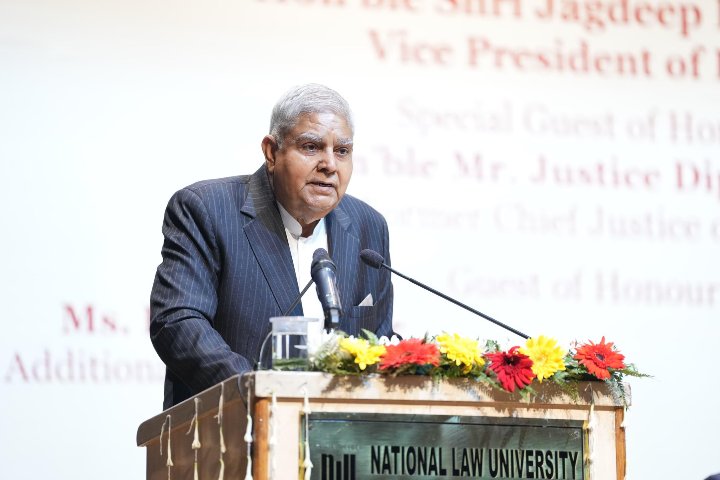Revisit Veeraswami Judgment: VP Dhankhar Advocates Transparent Judiciary
Reiterating the foundational principle that the rule of law is central to a healthy democracy, Shri Dhankhar warned against shielding individuals from investigation.

- Country:
- India
In a powerful and evocative address during the launch of the book “The Constitution We Adopted (With Artworks)” edited by legal luminary Shri Vijay Hansaria, Vice-President of India Shri Jagdeep Dhankhar urged a fundamental reassessment of the landmark K. Veeraswami judgment of 1991. This historic Supreme Court decision had created what the Vice-President described as an “impregnable cover” around judges in matters of criminal investigation, a protection he now believes must be carefully revisited in light of recent concerns around accountability in the judiciary.
A Call to End Judicial Immunity from Scrutiny
Referring to the Veeraswami verdict as an example of “judicial legerdemain,” Shri Dhankhar emphasized that the immunity afforded by the judgment has created a “scaffolding of impunity” that neutralizes public accountability. In what appeared to be a sharp critique of the long-standing precedent, he stated that the current judicial climate is ripe for change and commended the present Supreme Court and Chief Justice for showing signs of greater openness and accountability.
“I have full trust and confidence in the present Supreme Court,” said Shri Dhankhar. “In a short time, the current Chief Justice has demonstrated a commitment to ensuring that the judiciary works in a way that soothes the people at large.”
Protecting Judicial Integrity While Ensuring Accountability
While underlining the critical need to protect judicial independence, the Vice-President also emphasized the importance of establishing a transparent and accountable in-house regulatory mechanism. “Our judges must be insulated from sinister designs that seek to undermine their independence,” he said. “But at the same time, we cannot afford to let any institution remain beyond the scope of scrutiny.”
He pointed out the paradox where judges may be investigated through mechanisms lacking constitutional legitimacy, consuming the valuable time of Chief Justices—especially in courts with jurisdiction over multiple states—when such inquiries should be more structured, efficient, and sanctioned by a robust legal framework.
Need for Swift Investigation and Legal Reforms
Shri Dhankhar also raised serious concerns about the slow pace of investigation into a recent high-profile incident involving the alleged recovery of large sums of cash from a judge's residence in Lutyens’ Delhi. He expressed dismay that an FIR had still not been filed, despite the serious nature of the allegations and the public interest involved.
He highlighted that the only constitutional functionaries who enjoy limited immunity are the President and Governors, and even that is restricted to their time in office. “When it comes to national interest, we cannot divide people into insiders and outsiders. We must hold every individual and institution accountable under the law,” he insisted.
Emphasizing Rule of Law and Democracy
Reiterating the foundational principle that the rule of law is central to a healthy democracy, Shri Dhankhar warned against shielding individuals from investigation. “The surest way to degenerate an institution is to protect it from scrutiny,” he said. “Our democracy thrives on expression, dialogue, and accountability.”
He urged all institutions to uphold the sanctity of law and called upon the judiciary to lead by example in matters of transparency and integrity. “The entire nation is waiting for the truth to come out. People are concerned about the money trail—its source, its purpose, and whether it compromised the system.”
Commending Justice Khanna and Present Judiciary
He reserved particular praise for the outgoing Chief Justice Sanjiv Khanna, lauding him for his efforts to instill accountability and restore public trust. “Justice Khanna has set high standards by placing critical documents in the public domain. It was a commendable step in projecting transparency,” he noted.
The Vice-President, identifying himself as a “foot soldier of the judiciary,” reiterated his lifelong commitment to upholding judicial dignity and constitutional values. He stressed that while respect for judicial independence must be absolute, it should not become an excuse to shield wrongdoings.
The Way Forward: Scientific Investigations and National Vigilance
In a compelling appeal for swift and scientific investigation, he underlined that the lack of visible progress has led to public speculation and anxiety. “Everyone knows it; names are circulating. Reputations are at stake. This is the moment for the judiciary to undergo an image makeover,” he said.
Shri Dhankhar also highlighted the public’s right to know and the damaging impact of delays in disclosing critical incidents. Referring to the event of March 14–15, he questioned how such an incident could be hidden from public view for over a week in a country of 1.4 billion people. “Such breaches of integrity erode faith in the system,” he warned.
Upholding Protocol and Institutional Dignity
In his closing remarks, he reflected on protocol and its symbolic importance. Citing a recent reminder by the Chief Justice about respecting institutional hierarchy, he noted his own absence in official photographs and expressed hope that future vice-presidents would be afforded their due place.
“Adherence to protocol is not personal—it is institutional,” he said, acknowledging the Chief Justice’s efforts to highlight this issue and calling on the bureaucracy to uphold the dignity of every constitutional office.










